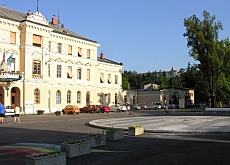Italian unions have no fear of Slovene workers

Opponents of a free movement of labour treaty with the European Union say extending it to the ten new EU member states will lead to wage dumping and higher unemployment.
But a visit by swissinfo to Italy’s border with Slovenia showed that union bosses on both sides are firmly behind the accord, saying it offers the best protection against wage dumping.
Opponents say native Swiss and people already working in Switzerland would be forced to accept lower pay or look for other jobs, if the treaty extension is approved by Swiss voters in a referendum on September 25.
The government has already announced measures to prevent wage dumping, but opponents – particularly in the border regions of Italian-speaking Ticino and French-speaking Geneva – say these are inadequate.
But on the frontier between Italy and Slovenia, unionists from both sides are demanding that a moratorium on implementing the treaty be revoked. Friuli Venezia Giulia is the only Italian region which borders one of the new member states.
Social dumping
“Social dumping was a reality before Slovenia became part of the European Union,” says Roberto Treu, president of the Friuli Venezia Giulia/Slovenia Inter-regional Trades-Union Council (CIS).
The reason is because Slovenes were not allowed to work in Italy, and so were obliged to take on jobs without a proper contract, which naturally affected their working conditions.
Union bosses say that implementing the treaty on the free movement labour would make it possible to regularise the position of many of these undeclared workers.
But aren’t Italians afraid that the Slovenes will “steal” jobs from local workers?
“The cross-border workers are mainly domestic workers, elderly care workers, agricultural labourers, lorry drivers… They are doing jobs which Italians are no longer prepared to take on. People do have some irrational fears, but it is not a big issue,” claims Roberto Treu.
As well as the fact that the “wage gap” between Italy and Slovenia is decreasing year by year, Pavle Vrohovec, secretary of the Slovenian ZSSS union, points out that “Slovene workers are not very mobile; 82 per cent of families are owner-occupiers, which makes it much more difficult for them to up sticks and move.”
No influx
There has also been no large influx of Slovene firms and self-employed workers into Italy. The current moratorium on free movement applies only to people taking up salaried employment.
“There has not been any significant change,” affirms Roberto Treu. His opinion is shared by the President of the Friuli Venezia Giulia region, Riccardo Illy, who thinks that “Slovene firms already have their hands full in their own country”.
Jani Zegnar, the manager of a Slovenian construction company, concurs. He describes the Italian market as being “of little interest”.
One problem that does exist is that of foreign firms undercutting their Italian rivals by paying lower wages. This is illegal under European law and will remain so until the “Bolkenstein Directive”, which sets new rules regarding the service sector, comes into force.
“In Friuli Venezia Giulia, 92 out of 100 inspections revealed illegal practices, and in roughly 60 cases this was because non-Italian workers were not being paid adequately,” says Roberto Treu.
Relocation
And what is happening on the other side of the border? The EU’s new members are often criticised for having more laissez-faire labour legislation than the original 15. Are the trade unions not afraid of Italian firms moving to Slovenia?
Representatives of the Friuli Venezia Giulia/Slovenia CIS say no, “because the differences in worker protection and security are not significant”.
So far relocation has been only a marginal phenomenon, and this will probably continue to be the case: the Slovenian market is very limited and differences in labour costs are not such as to make relocation an attractive proposition.
Italian firms are not relocating to Slovenia, but to places like China, Romania and Croatia… as indeed are Slovenian businesses.
swissinfo, Daniele Mariani in Trieste
In 2004 the unemployment rate in Slovenia was 6 per cent; in Italy it reached 8 per cent.
GNP per capita in Slovenia is estimated at €19,000, in Italy €25,560.
The Friuli Venezia Giulia/Slovenia Interregional Trades-Union Council (CIS) was established in 1994 to strengthen cooperation between Slovenian and Italian trade unions, and in particular to protect the rights of workers living in the border zone.
The CIS advocates the opening up of the labour market to workers from both countries.
It says this will prevent Italian firms from employing Slovenian workers illegally, and lead to an effective cross-border economic area.

In compliance with the JTI standards
More: SWI swissinfo.ch certified by the Journalism Trust Initiative











You can find an overview of ongoing debates with our journalists here . Please join us!
If you want to start a conversation about a topic raised in this article or want to report factual errors, email us at english@swissinfo.ch.